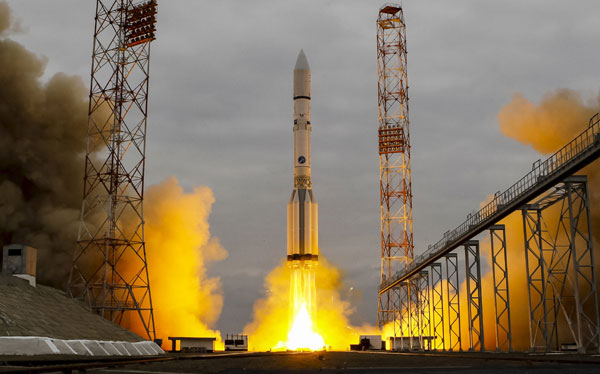China aims to launch Mars probe in 2020
Updated: 2016-03-21 16:39
(Xinhua)
|
||||||||
 |
|
The Proton-M rocket, carrying the ExoMars 2016 spacecraft to Mars, blasts off from the launchpad at the Baikonur cosmodrome, Kazakhstan, March 14, 2016.[Photo/Agencies] |
BEIJING -- China is preparing to launch a Mars probe in 2020, and it is expected to arrive on the red planet in 2021, aerospace expert Ye Peijian has said.
"Although we are not the first Asian nation to send a probe to Mars, we want to start at a higher level," said Ye, an academician of the Chinese Academy of Sciences.
The probe will include an orbiter, a lander and a rover. The orbiter will conduct global surveys of Mars, and the entry device will land a rover on the surface. Parachute and reverse thrust engine technologies will probably be used in the landing, according to Ye.
"We have less than five years till the launch, but we are confident. The probe is being developed by the team that completed the Chang'e-3 lunar probe," says Ye, leader of the team with the China Academy of Space Technology (CAST).
A 3D demonstration video from CAST shows how the Mars probe will fly about 10 months before closing on the red planet. Controllers on Earth will guide it into a large elliptical orbit and the orbiter and lander will separate. The orbiter will stay in orbit for at least a year to photograph key areas and monitor the planet's environment.
Unlike the lunar lander of the Chang'e-3 probe, the Mars lander will carry a gasbag, a parachute and reverse thrust engines, which will together secure a safe landing, according to experts from CAST.
Zheng Yongchun, an associate researcher with the National Astronomical Observatory, says that combining orbiting exploration and a roving probe in one mission is a rational choice for starting Mars exploration at a high level.
"The best and most direct method to look for evidence of life on Mars is to explore the surface. Mars will be a key focus of China's deep space exploration in the future," Zheng says.
But communicating with the Mars probe is still a great challenge. China needs to develop a long-life, powerful relay communication device on the orbiter, says Zheng.
So how will the Mars rover differ from lunar rover Yutu (or Jade Rabbit), which China sent to the moon at the end of 2013?
- Pentagon chief says Europe needs to accelerate anti-IS efforts
- Jeb Bush endorses Cruz's election bid
- Chinese passenger may sue Virgin Atlantic
- People pay condolence to victims of Brussels attacks
- Police issue wanted notice for suspect after Brussels attacks
- China eyes cooperation plan for Lancang-Mekong countries

 First lady Peng Liyuan leads fight against tuberculosis
First lady Peng Liyuan leads fight against tuberculosis
 Faces at Boao Forum for Asia Annual Conference
Faces at Boao Forum for Asia Annual Conference
 In photos: Lunar eclipses visible in eastern China
In photos: Lunar eclipses visible in eastern China
 Chinese chasing Spring blossoms around the country
Chinese chasing Spring blossoms around the country
 Migrant couple returns to hometown to raise chickens
Migrant couple returns to hometown to raise chickens
 Victims of Brussels attacks commemorated
Victims of Brussels attacks commemorated
 In photos: Brussels rocked by multiple explosions
In photos: Brussels rocked by multiple explosions
 Raul Castro and Obama hold talks in Havana
Raul Castro and Obama hold talks in Havana
Most Viewed
Editor's Picks

|

|

|

|

|

|
Today's Top News
Marriott unlikely to top Anbang offer for Starwood: Observers
Chinese biopharma debuts on Nasdaq
What ends Jeb Bush's White House hopes
Investigation for Nicolas's campaign
Will US-ASEAN meeting be good for region?
Accentuate the positive in Sino-US relations
Dangerous games on peninsula will have no winner
National Art Museum showing 400 puppets in new exhibition
US Weekly

|

|







